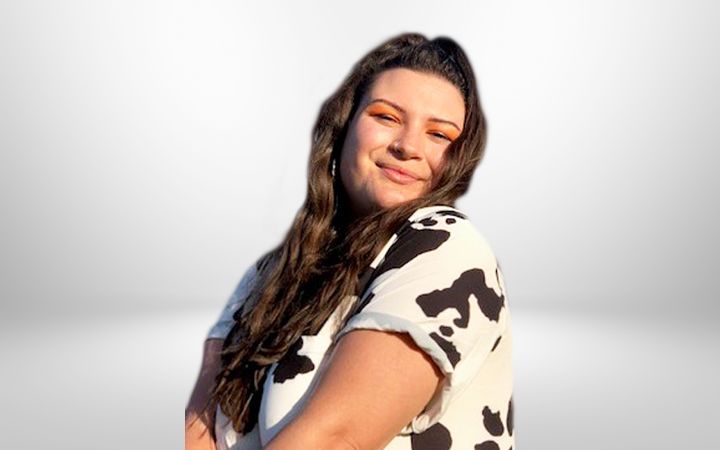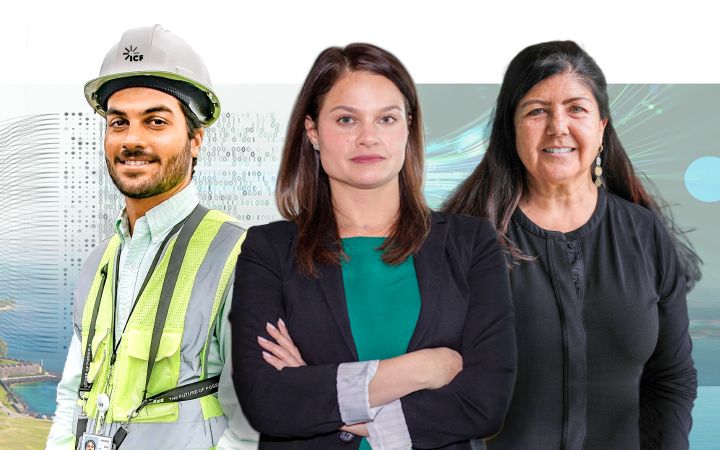Bringing diversity, equity, and inclusion to the energy industry
Dany Kahumoku brings a personal history of human rights work, youth mentorship, community advocacy, and her Native Hawaiian heritage to transform the energy utility sector

Dany Kahumoku has always wanted to do work that matters. That makes a difference. That has an impact. As a senior diversity, equity, and inclusion (DEI) specialist, she’s not only advising on energy utility programs, she’s also contributing to our internal capacity-building of DEI learning and development. It’s a new role at ICF and one you don’t often find in our industry, but Dany stepped into it with the right blend of professional expertise and lived experience.
Finding the right place to bring her passion
Before joining ICF, Dany worked in nonprofits, where “it was easy to be engaged in equity, justice, and community,” she remembers, “but it was hard to find a balance of centering the mission and my own well-being to keep my work sustainable.” Initially coming to ICF to support a specific client in the Oregon energy sector, Dany encountered a new industry and a new team.
But she missed the type of impact she’d made in the work she’d done before, so she started attending trainings that blended her new energy industry knowledge with her lifelong passion for human rights. She enjoyed learning about energy equity, utility affordability, and community accessibility. Then in 2020, ICF developed a role to analyze and propose solutions to the injustices many communities experience within the energy sector—and Dany knew she was the perfect fit.
“I work alongside nearly 1,000 colleagues supporting over 60 energy clients, so this is an opportunity to bring equity to diverse spaces and make a big impact.”
Learning from the community
The intersection of justice and energy is multilayered, and Dany’s work creates ripples far beyond where it started. Take Dany’s advisory work with Seattle City Light: As a client, they’ve been outspoken about racial equity and wanted to bring that focus to their various programs. For example, we’re working with them on a multifamily charging program to provide more electric vehicle (EV) charging stations throughout the city. However, the barriers to owning and operating an EV have raised questions about accessibility and potential negative impacts, such as potential gentrification caused by installing equipment without community input.
In response, we’ve partnered with Kambo Energy Group to provide education about EVs to community leaders and community-based organizations, and receive insights into communities’ concerns about EV ownership and infrastructure development. Part of Dany’s role was to ask how we can “creatively succeed” in reaching the many different communities potentially affected by the charging program, ranging from skyrises to affordable housing, while acknowledging big barriers and conflicting community priorities productively. The ICF team has consistently integrated feedback into the program rollout to meet a range of client and community-centered goals.
Dany’s experience with Seattle City Light’s openness in the areas of equity and environmental justice catalyzed opportunities to develop internal adult learning and resources to bring to other clients. She has a new-found passion for deepening and standardizing our approach to equity-related work—and she’s helped develop materials to help us see the benefits and implications of equity work. We’re now able to track metrics to identify past successes and gaps and identify where there might “be synchronicity so we can build future programs with equity as a focus from the start,” she says.
Drawing from indigenous knowledge
Dany’s approach to DEI and environmental justice doesn’t only come from her professional experience—she’s lived in every western environment, from the Pacific Northwest to the California coast to the desert of New Mexico where she currently lives on the traditional lands of the Sandia Pueblo. While she’s never lived on the islands, her native Hawaiian heritage mixed with experiences in these different geographies provides her with a unique perspective. “I understand how important it is to bring indigenous people not just into the conversation, but into positions of power and decision-making so we can leverage their traditional knowledge and solutions to addressing climate change,” she says.
It’s a unique time to be part of the energy industry, particularly as an indigenous person. There’s a recognition of the industry’s negative effects and disproportionate impacts, with a drive toward remediating and systems restructuring known as the “just transition.” Through her lived and learned experiences, Dany believes her personal role in the just transition is “about lifting up people who have a much greater connection to the solutions and knowledge than I honestly ever could,” she explains. “The individuals who have sustained this land for centuries have the skills and knowledge it will take to bring us into an era of sustainability and renewal.”
“Indigenous people have an inherent connection to the land, the environment, and the world around us. That’s something very deep within my bones. But what I represent is not the full spectrum of Hawaiian knowledge and practice, so it’s about lifting up others with a much greater connection to solutions.”
Embracing our culture of bringing your passion
The passion Dany has for her work, underpinned by ICF’s values, is what drives her. She’s always cared deeply about human rights, especially for young people, people of color, women, and LGBTQIA+ folks, and she volunteers with several youth programs, coaching two YMCA volleyball teams and mentoring with an organization called Running 505. She’s also a member of the Oregon Zoo’s Community Advocacy Council, where she recently helped organize an event that again brought her DEI advocacy: The Council partnered with community-based groups to bring people to the zoo who historically could not access or afford to visit.
Three years later, as her DEI specialist role continues to evolve, Dany’s the first to admit that she’s still learning as she goes. Some days she discovers an outcome she wasn’t necessarily looking for and pushes herself to reflect and do better next time. But there have also been times when she’s been able to say, “that was a better outcome than I expected it to be.”
